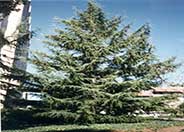
Common name:Deodar Cedar, Calif. Christmas Tree
Botanical name:Cedrus deodara
This fast-growing, coniferous evergreen is capable of reaching a size of 80' high by 40' wide. Its needles are a light, silvery green color.
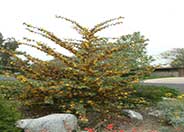
Common name:Flannel Bush, Fremontia cv.
Botanical name:Fremontodendron 'California Glory'
'California Glory' is an open and spreading evergreen shrub 10'-20' in height with many yellow flowers blooming in spring. It needs good drainage and little summer water. It is a native plant to California as the name suggests and it is drought tolerant. -Cornflower Farms
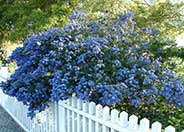
Common name:Concha California Lilac
Botanical name:Ceanothus 'Concha'
Concha is a lilac that grows 6'-8' in height and width. It has small narrow leaves with intense dark blue flower clusters in spring. It is tolerant of coastal and inland conditions.
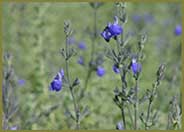
Common name:Germander Sage
Botanical name:Salvia chamaedryoides
Low mounding perennial with long bloom spreads by underground runners. Produces a small, silvery foliage which serves as a background for bright blue flowers. Bruised leaves have spicy fragrance. Native to eastern Mexico 7-9000' in desert habitat
Grows to mature size of 2' tall and wide. Heaviest bloom in spring and early fall, intermittent throughout the rest of the season. Full sun, well drained site. No fertilizer. Drought tolerant.
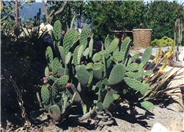
Common name:Mission or Tree Cactus, Indian Fig
Botanical name:Opuntia ficus-indica
This unusual looking cactus forms a trunk topped with pads (actually the leaves) that have few spines. Flowers are yellow to orange in late spring and early summer, found at the edges of the pads. Green edible fruit follows the bloom period. Fruit turns purple when ripe. This cactus need full sun and well draining soil. It is frost sensitive. The newly formed pads, or nopales of this cactus are used to make a delicious salsa,. The major pest comes from a scale.
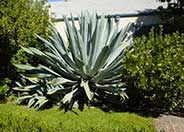
Common name:Century Plant, Maguey
Botanical name:Agave americana
This plant is fast growing to about 6'-10' tall and 8'-13' wide. Wide gray leaves have stiff terminal spines and recurved teeth on margins. It prefers full sun and well-drained situations. After blooming, which could take several years, it will die but will send up new pups from around the base. Some people are allergic to the sap. Removal is difficult if unwanted.
Designer: Wynne Wilson
Photographer: GardenSoft
Maintain a two to four inch layer of mulch on the soil surface to reduce weeds, infiltrate rain water, and reduce compaction.
Attract, or buy beneficial insects such as ladybugs and lacewings to control pest outbreaks in your garden.